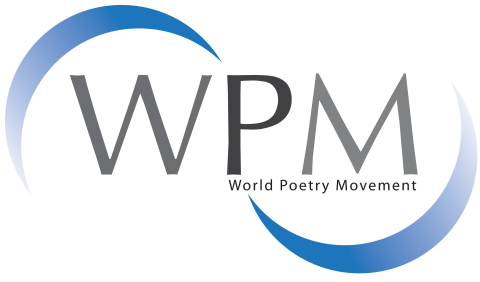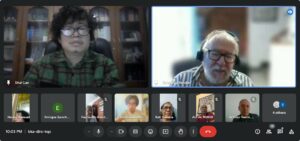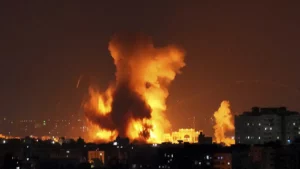By Vaughan Rapatahana
Firstly, World Poetry Movement Oceania sends its greetings and support to the first WPM Congress. The fact that it is being held is by itself an extraordinary achievement.
There has been action over time to set up a group covering the Oceania region. The latest reboot began a couple of months ago. We have deliberately been conservative in our actions because we want it to be sustained.
We now have 12 representatives spanning four countries plus co-coordinators. A Facebook page has been set up (thanks Roya Pouya) which has well over 200 members and is steadily growing. We actively publicise events across the region and elsewhere. Also publicised on the page is a list of Australian poetry groups (Lou Steer) & poetry publishers (Poetry Sydney).
It was important to get a tangible achievement so WPM is now involved with the South Asian issue of APC that was already taking submissions. That will be out in August. The following issue will be East and Southeast Asian issue.
We needed a declaration of principles. The draft was distributed widely for comment, and was posted on July 1. It was initially based on other statements but has a particular emphasis on promoting & collaborating with pre-existing groups & projects.
An event celebrating the Congress was coordinated by Lou Steer.
The representatives and coordinators believe this to be a substantial list of achievements in barely 2 months.
AUSTRALIA
Successive conservative governments in Australia over the last 30 years have actively defunded literature, which has impacted journals, publishers and conferences. Poetry publications were particularly affected impacting on both established and developing poets. In response, poets are developing a highly active spoken word and performance scene which does not rely on government support. This new scene is characterised by its openness to both new forms of poetry and to diverse voices including ethnicity, gender, religion and LGBTIQA+. For example, Bankstown Poetry Slam in SW Sydney is the world’s largest poetry slam. Covid has of course set everything back somewhat. A multitude of self directed grassroots poetry groups meet regularly all over Australia encouraging our art form. A list of poetry groups is available on WPMO Fb page.
AOTEAROA NEW ZEALAND
Generally, poetry in and across Aotearoa New Zealand is thriving, with an increasing number of poems and collections having at least some te reo Māori (Māori language) included, as well as references to te ao Māori (The Māori ethos) within any given toikupu (poetry). There is also a long-standing tradition of mōteatea (Māori song-poetry). There are several print and online poetry publications where both established and beginner poets can submit, as well as several publishing houses who will include poetry collections among their products. Mind you, competition to be accepted both for publication, as well as for the funding available for poets in general, is rather intense, and of course, not everyone is successful. Finally, it is important to point out that poetry in Aotearoa New Zealand is also – finally – inclusive of non-Māori and non-Pākehā voices, and more Pasifika and Asian poets are being published and heard. We now have Chris Tse as Poet Laureate – after David Eggleton – and significant anthologies have been published recently pertaining to NZ Asian poets, or will be published in the very near future – pertaining to NZ Pasifika poets.
PAPUA NEW GUINEA
Writing has evolved since the inclusion of poetry in the late 60s. Breaking linguistic barriers and low literacy rates, poets struggle to compete with other forms of art in terms of publications here in Papua New Guinea. With the exclusion of poetry in the current academic curriculum, especially government-run institutions; small writing workshops, the Port Moresby Arts Theatre, online forums, and reading material have been particular in promoting poetry growth.
Summary of the poetry
Activities and promotion of New Zealand Asian-Chinese community
New Zealand has a total population of 5.1 million with European descent at the top of the population, followed by the indigenous Māori, and finally Asians and Pacific Islanders. The Asian population is projected to make up 26 percent of the total New Zealand population by 2043, compared with 16 percent in 2018. This population is currently the fastest growing ethnic group. Furthermore, there are a high number of Asian students, working visa holders and travellers that further accelerate this trend. There are two major Chinese newspaper based in Auckland: New Zealand Herald (Chinese version) and Mandarin Page. Mandarin Page has the longest history of publication. A literature column has been dedicated to poetry publication since January 2019. This column’s name is ‘Overseas literature Journal’, and it partners with China’s state-owned newspaper ‘People Daily’. They publish bilingual poems featuring poets globally.
There are a number of poetry groups actively involve the community. The biggest group is New Zealand Chinese Writer Association, founded 1994, it has the longest history among the Chinese community. A New Zealand Chinese Literature Competition is held with handsome cash prize annually. It promotes culture sensitivity and enriches cultural diversity.
There are various influential websites that promote poetry as well. AUSNZ.Net is one of the most popular websites, and it is the number one circulating in Oceania.
Since 2023, Mandarin Page published a number of issues dedicated to WPM poets and coordinators as the images below.
There are four fundamental groups that deserve special acknowledgement for their contributions as following:
ASP Poetry
Was founded in 2018, and has cooperated with the Italian “Image and Poesia”, Lebanon Naji Naaman Literature prize foundation, China official magazines, the Singapore poetry festival, the Canada Chinese Dragon boat festival and other international poetry groups since 2019. Collaboration works include translating, publishing, hosting poetry events. It has published more than 120 international poets’ works, including WPM members.
The New Zealand Poetry/Art Society
Founded in 2018, this society is currently active in the Chinese poetry circle and is in line with the mainstream of New Zealand society. They have planned many poetry readings and traditional Chinese cultural activities.
The New Zealand Federation of Literary and Art Associations
Founded by the New Zealand Queen’s Medal winner, this association has three newspaper columns in Australia.
The New Zealand Association of Poetry and Painting Club
This Association currently maintains a newspaper column in the United States, mainly focusing on Chinese haiku.
s a starting point, a wide range of poets in Oceania were consulted. The following goals, strategies and acknowledgements were identified and adopted.
We are committed to:
- Promoting poetry through activities like poetry readings, workshops, conferences, poetry festivals, publications of poetry anthologies, translation projects, outreach programs for youths in schools and colleges, poetry competitions, mentorship programs, and literary awards. Rather than competing with existing organisations in our member states we would seek to publicise, augment and coordinate with them where possible.
- Acknowledging the outstanding work done already by the WPM and its regional organisations, building on these successes with both initiatives and augmenting/supporting other projects undertaken by WPM groups.
- Using poetry to engage with environmental issues and inspiring a sense of stewardship and care for the natural world, and advocating for sustainable living.
- Utilizing poetry to defend freedom of speech, human rights, and rights of native peoples and stateless nations; promoting inclusion through poetry; solidarity with social, economic, and political victims, including refugees and displaced people; standing firm against all forms of oppression.
Action Plan—-
- Develop a plan of action and implement WPM activities. Expand WPM representatives across Oceania countries.
- Create webpages, social sites, or other media channels for greater mutual engagement of communities and our artform.
- Promote cross-cultural translation projects in collaboration with publishing houses.
- Conduct poetry actions to address pertinent issues related to human dignity, freedom of expression, minority communities and people in crisis.
- Through poetic actions, after consensus processes, express solidarity with the oppressed in conflict-affected countries in their quest for comprehensive peace and justice.
- Promoting poetry in education by lobbying for teaching and learning of poetry in schools and universities. Supporting efforts to develop poetry curricula, train teachers in poetry pedagogy, and create opportunities for students to engage with poetry.
- Participate in poetry actions generated by WPM International coordinating committee and other continental chapters. Build a network of poets, poetry organisations, literary festivals; and collaborate with publishing houses, schools, universities and the media.




